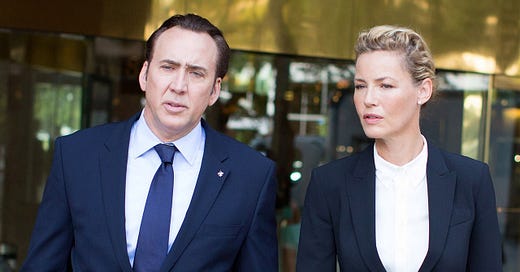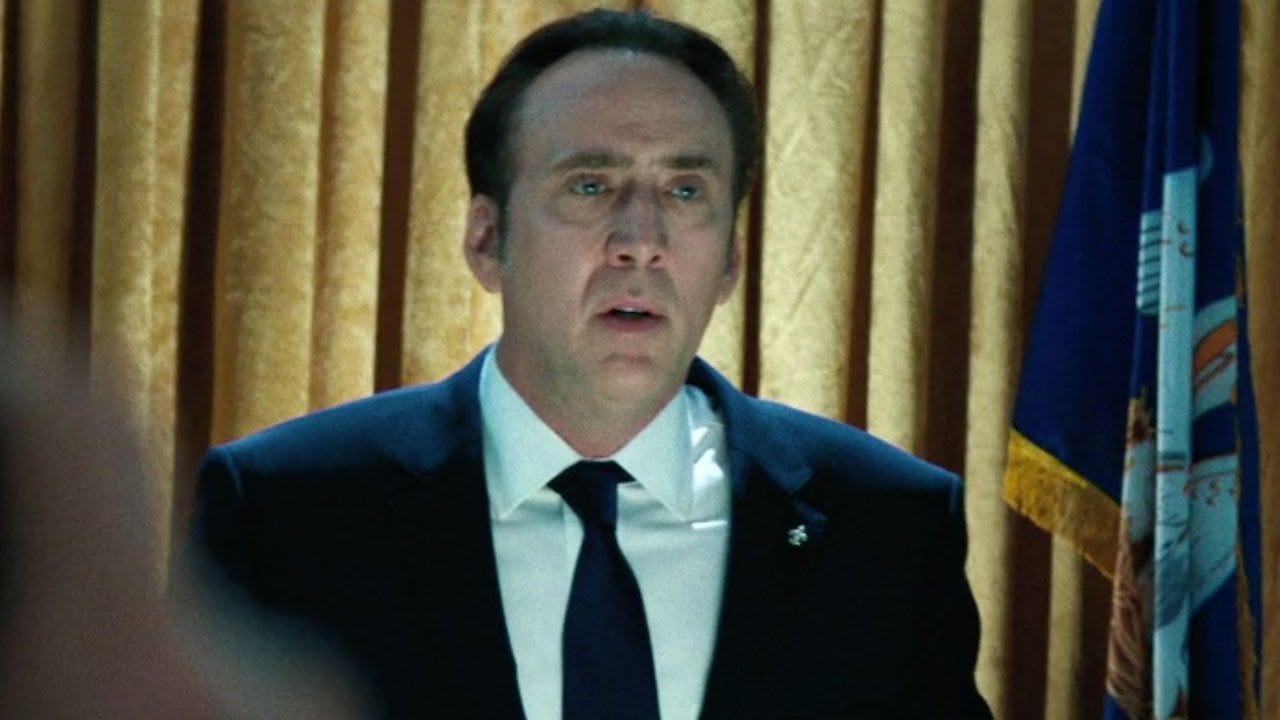Austin Stark’s “The Runner” is the type of modest studio film that used to come out in the 90’s, using the capital of its marquee star to explore a tale of corporate moral complexity. In this case, the star is Nicolas Cage, here shaking off a tough decade of work, giving one of his more nuanced performances as a beleaguered politician who can’t outrun the chyrons.
Cage is playing Colin Pryce, a Louisiana politician who, in the wake of the environmental tragedy of the British Petroleum spill, is working to cleanse the waters and maintain the economic health of local territories. The film generally depicts Pryce as a competent, even caring sort, which is a double-edged sword. There is a novelty about a movie featuring a principled politician – you don’t see those very often. But it also establishes Pryce as a figure of virtue in the eyes of the public, which means it's certain everyone will be aiming for his head.
Early on, we find out that Pryce is having an affair, which punctures that sainthood that the media wishes for him. But we quickly learn that Pryce remains ideologically pure, even if he’s stepping out on his wife (Connie Nielsen – why have we kept casting this goddess in generic Wife roles?). The movie makes a clean cleave between his own profession and his bedroom activities, which becomes the crux of the story. Can a legislator be trusted after it’s been discovered that his family life is not in order? Worth noting: this movie came out before we elected a rapist to the Oval Office.
“The Runner” starts at an extremely low boil, so it’s unfortunate that it didn’t register with certain critics given that there are two major developments that become prominent later in the narrative. For one, Pryce’s father is a career politician with decidedly more fungible principles. He’s played by Peter Fonda with his customary slimy charisma. While Cage’s Pryce struggles with the discovery of his extracurriculars, his father urges him to simply own it, to show no shame for his bedroom dalliances, to spin it as business as usual. But a later plot development reveals a shocking part of the reason why Pryce is struggling with this discovery, and it is certainly an interesting and troubling wrinkle that reflects on certain class discrepancies. It’s unfortunate that, at the film’s end, it seems like the movie is siding with Pryce regardless. As if there was just too much moral complexity within the plot.
I gotta blow the whistle on something no one ever mentions about prison. What’s amazing is that, if you can afford it, you can acquire pretty much anything while incarcerated. But for the average prisoner, the most difficult resource to acquire is toilet paper. Different institutions have different policies, but typically, you can acquire a couple of rolls of paper every two weeks, and it is YOUR toilet paper, no one else’s. Can you make two rolls last two weeks? Best scenario I’ve ever found was two rolls one week, and one roll the next week, making three rolls for two weeks.
They sell extra toilet paper on the commissary, where you shop once a week at 6 AM breakfast, or right after lunch. But like everything on commissary, that’s extremely expensive and they’re often out of stock. Imagine if you could shop once a week, and you needed toilet paper, and you realized you weren’t going to get any more for another week. Technically, if you asked, officials would have to give you more. Looking back, I was stunned at how officers and counselors would flat-out lie about their access to toilet paper, saying to wait, or that they couldn’t get any of it now, when it fact it was usually in a closet they didn’t feel like unlocking. If you’re not willing to hustle for toilet paper, prison ain’t for you.






